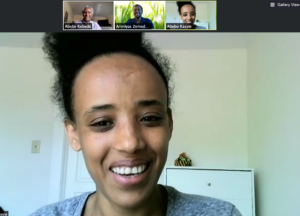Postdoctoral Application Tips
Postdoctoral Fellowships for International Applicants
I just wanted to give a piece of advice for those who are on the process of applying or  planning to pursue their postdoctoral studies. It is important you take the time to plan, decide on what kind of knowledge you want to acquire from your postdoc training and do research on principal investigators (PIs) that have research interests that align with your career goals. Simply looking up PIs research interests from university websites can give you a general idea of what they do but reading a couple of papers from a research group of interest is important to have a better understanding of the research undertaking. In addition, be careful when choosing your postdoc advisor (also true for those planning to pursue their PhD). I cannot speak about other disciplines but in chemistry, it is very important you know who you are working with. There are stories of postdocs being used as technicians by some greedy and self-centered PIs. Just remember that you are doing a postdoc/PhD to become an independent thinker not to execute certain instructions planned/provided by someone else. The world is a small place; it is not difficult to learn about someone’s reputation these days, so make the effort to know more about potential PIs that you are interested in from their former postdocs, students and other people who may know them closely before accepting an offer. Personally, I do not think of a postdoc as a career instead a bridge to transition from being a student to having an independent career that one aspires to have as life progress. Postdoc trainings could be essential if you are planning to pursue a career in academia, particularly for tenure track positions in colleges and universities. However, it is less likely that industry positions would require a postdoctoral experience if they do it is preferred but often not mandatory. In fact, if your goal is to have a career in industry it is not recommended you spend years working on your postdoc, one or two years will be sufficient.
planning to pursue their postdoctoral studies. It is important you take the time to plan, decide on what kind of knowledge you want to acquire from your postdoc training and do research on principal investigators (PIs) that have research interests that align with your career goals. Simply looking up PIs research interests from university websites can give you a general idea of what they do but reading a couple of papers from a research group of interest is important to have a better understanding of the research undertaking. In addition, be careful when choosing your postdoc advisor (also true for those planning to pursue their PhD). I cannot speak about other disciplines but in chemistry, it is very important you know who you are working with. There are stories of postdocs being used as technicians by some greedy and self-centered PIs. Just remember that you are doing a postdoc/PhD to become an independent thinker not to execute certain instructions planned/provided by someone else. The world is a small place; it is not difficult to learn about someone’s reputation these days, so make the effort to know more about potential PIs that you are interested in from their former postdocs, students and other people who may know them closely before accepting an offer. Personally, I do not think of a postdoc as a career instead a bridge to transition from being a student to having an independent career that one aspires to have as life progress. Postdoc trainings could be essential if you are planning to pursue a career in academia, particularly for tenure track positions in colleges and universities. However, it is less likely that industry positions would require a postdoctoral experience if they do it is preferred but often not mandatory. In fact, if your goal is to have a career in industry it is not recommended you spend years working on your postdoc, one or two years will be sufficient.
There are several universities that offer postdoctoral opportunities and are often administered by faculty members that have funding sources. Most PIs pay their postdocs from their research grants; however, you can also apply to other external postdoctoral fellowships to cover your own postdoc salary (some fellowships might provide additional assistance for expenses related to research equipment, professional conference travels etc.). It is likely that a principal investigator who is reluctant to hire you would be willing to offer a position if you come with your own money. Having your own postdoctoral fellowship also gives a positive signal about your preparation to have a successful postdoc. In addition, proposal writing and learning on how to sell your research to a general audience are important components of your postdoctoral fellowship application processes, essential skills for what is awaiting you. There are so many postdoctoral fellowships available, but not all fellowships are relevant for international students due to eligibility requirements. For example, most government related fellowships in the U.S. require U.S. citizenship or permanent residency. If you are searching for postdoc positions/permanent jobs on the internet, first look at eligibility requirements before wasting your time. As an international student myself, it could be frustrating to go through all the way to an interview process to find out you do not qualify because of your citizenship status. You see, some people have a different take on this, they believe that going through a job application process including interviews can be used to gain interview experiences although you have zero chance of getting the job. While this is a valid point, in my opinion, it is better to invest our time on something that has some promise and do a very good job of doing it, instead of spreading ourselves too thin. At the end of this document, I have included a list of postdoctoral fellowships that may be applicable to you, but the deadlines for 2020 for most of them have already expired. Also, year of 2020 is uncertain anyways, but can be utilized wisely to make plans that will be acted upon after the era of coronavirus.
There are different ways of landing your postdoc including the ones listed here. 1) Connect with potential PIs through your PhD advisor. This is by far the most widely used approach at least in my field to easily connect with other researchers. Your advisor has a bigger professional circle than yours, so use him/her to help you grow your professional circle as well. It is important you make an appointment with your advisor to have a discussion on your career goals and plans to pursue a postdoctoral research. If you cannot do in person meetings with your advisor, send a very detail email that could get your message across or ask your advisor to hold a virtual meeting if technological access is not an issue. Some advisors have so much on their plate or may not be very organized people, so it is your responsibility to take the lead on your future. Prior to your meeting, prepare a list of potential PIs that you are interested in working with including details why you chose certain researchers. After your conversation, kindly ask your advisor if he/she would be willing to write a quick email behalf of you. An email from your advisor can make all the difference because many of these PIs that you are contacting , especially those who are recognized in the field , are often bombarded by emails from applicants like you, so make sure to increase your visibility. 2) Take every possible opportunity to attend professional conferences and present your research. This is a good way to connect with professionals in your field. Do not be shy to introduce yourself and invite them to attend your talk or poster presentation. In addition, most conferences have career development sessions that you should never miss. They will give you great tips on how to write effective resume, cover letter and general guidelines on job hunting process. 3) Join professional networking websites such as LinkedIn and ResearchGate to expand your social network. You can connect with people who are in similar field of profession as yours or you can also choose to expand your horizon by connecting with others that may help you on the way. 4) Mentor: All three approaches mentioned above could be used to find great mentors not only to get you a job but also to guide you to a successful life.
Lastly, do not get discouraged if your initial attempts of postdoc/job applications are unsuccessful. There are different reasons why you could be rejected or never hear back even if your qualifications perfectly align to a certain job description. 1) PIs may not have funding or not certain of funding renewals 2) You may just happen to apply right after they hired someone 3) Some PIs’ can be only interested in applicants from certain schools/places. Therefore, there is nothing against or wrong with your qualifications, you just happened to apply at a wrong time, so do not get discouraged just keep on applying even more!
Have the following documents ready for any postdoc/job applications:
- Resume: Prepare an excellent resume. Be concise, keep it to a maximum of 2 pages. Remember, employers spend seconds skimming through your resume, so stay away from text intensive resume. Proof-read and make sure there are no spelling errors! Unfortunately, first impressions are more important than you may think. Buy a friend a cup of coffee or whatever can get this friend of yours excited to proof-reading your resume.
- Summary of your PhD work: A maximum of 3 pages is recommended. I will be happy to share mine (abebamar@gmail.com) for those interested in even if it may not apply to your field of study it can serve as a general platform.
- Cover letter: Here is where you need to do an excellent job selling your expertise according to the specifics of the job description. Never start writing a cover letter before having enough knowledge or feel comfortable about the position you are applying. Spend a good amount of time reading and customizing your experiences according to job requirements. For postdoc positions, you need to dig into papers published from a research group you are applying, please do not copy and paste general research interests from a group website. In fact, some PIs may get annoyed if you just copy and paste from their group website about their research interests, so refrain yourself from doing that. In general, your cover letter should entail why you are interested in, how your expertise will add value and what sets you apart from other applicants. Also, it is worth mentioning what you hope to gain from a postdoc training that can help you accomplish your career goals. There is a certain format that one needs to follow when writing an effective cover letter. Have a look at the following links, they are cover letter and resume examples from Harvard, Stanford and MIT.
http://hwpi.harvard.edu/files/ocs/files/gsas-cvs-and-cover-letters.pdf
https://ocs.fas.harvard.edu/resumes-cvs-cover-letters
https://academicpositions.com/career-advice/how-to-write-an-outstanding-postdoc-cover-letter
https://web.stanford.edu/class/inde231/CVs%20and%20Cover%20Letters%2005-06.pdf
https://mitcommlab.mit.edu/broad/commkit/cvresume/
https://capd.mit.edu/jobs-and-internships/resumes-cvs-cover-letters-and-linkedin/cover-letters
https://pdco.med.jhmi.edu/online-library/dl/stanfordphd_cg15-16.pdf
Postdoctoral Fellowships Applicable to International Students
https://www.fftf.slb.com/ (Women only, relevant for those in physical sciences, engineering and Technology)
https://exchanges.state.gov/non-us/program/fulbright-visiting-scholar-program/applying (Fulbright Visiting Scholar Program)
https://allenai.org/young-investigators (Computer scientists should consider this)
https://www.postdocs.ubc.ca/award/killam-postdoctoral-research-fellowship
http://hhwf.org/research-fellowship/ (Biomedical sciences)
https://www.scholars4dev.com/1877/aauw-international-fellowships-in-usa-for-women/
https://banting.fellowships-bourses.gc.ca/en/app-dem_elig-adm.html (Postdoc must be carried out in Canadian institutions for foreign applicants)
https://www.humboldt-foundation.de/web/georg-forster-fellowship.html (Based in Germany)
https://twas.org/opportunity/twas-csir-postdoctoral-fellowship-programme (Based in Brazil)
https://twas.org/opportunity/twas-cnpq-postdoctoral-fellowship-programme
https://www.daad.de/en/study-and-research-in-germany/scholarships/daad-scholarships/ (Based in Germany)
https://beckman.illinois.edu/research/fellowships-and-awards/postdoctoral-fellows-program
https://brancoweissfellowship.org/eligibility.html
https://schmidtsciencefellows.org/selection/eligibility/ (if only selected by your institution)
Anthropology:http://www.wennergren.org/programs/hunt-postdoctoral-fellowships
https://asntech.github.io/postdoc-funding-schemes/ (This link contains numerous fellowships for both PhD and postdoc applicants but check for eligibility requirements)
